A smart, surreal Smartphones from Ambassador Theater (review)
November 3, 2015 by Rosalind Lacy
A must-see, wacky send-up, Smartphones, is a fast-paced one-act about the fear of life without a mobile phone. Written in English by Spanish playwright Emilio Williams, award-winning director Joe Banno gives it a larger-than-life staging.
Smartphones raises an important question: Shouldn’t our deep involvement in cyber-tech gadgets bring us closer to each other?
No way, warns playwright Williams, who shows us through nonsensical, comic bits, which place his play firmly in theatre-of-the-absurd, how cyber-tech smart phones actually isolate us and drive us further  apart.
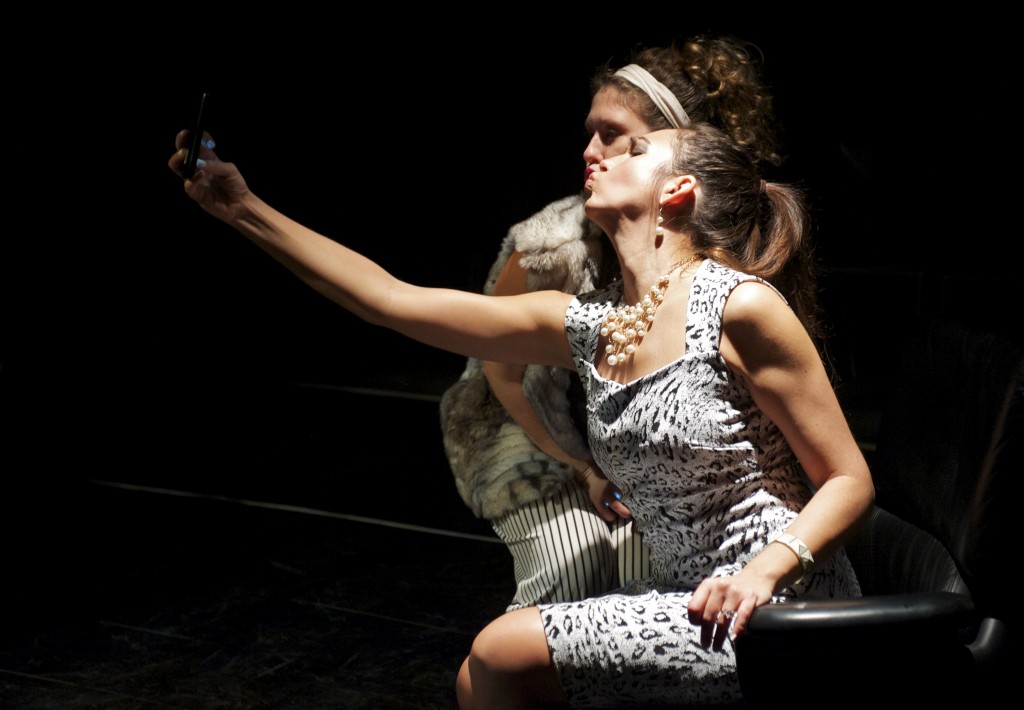
It’s a familiar Godot-like plot: Two married couples are trapped in their friend Fedé’s home waiting for his arrival. All four, Amelia (Ariana Almajan), Barnaby (Tekle Ghebremeschel), Chantal (Moriah Whiteman), and Dagobert (Shravan Amin), are so addicted to their smart phones that they text each other non-stop.
Amelia, dressed elegantly in a stylish white sheath, splotched with an ink-smear pattern, receives tweets that Fedé is “on his way.†But their host never arrives.
The setting in the tiny Mead Theatre lab, designed by David Ghatan, is minimalist : black swivel chairs and leather settee. The frenetic four guests share irrational anxieties, hyped with worry that their battery-powered phones will lose power. (The fear is known as nomophobia, an abbreviation for “no-mobile-phone phobiaâ€.) Communication could cut off. Not one has a charger. Friends on Facebook are friends Ariana Almajan as Amelia and (back) Moriah Whiteman as Chantal as long as there is battery power. All appear to be at the mercy of       in Smartphones from Ambassador Theater (Photo: Valentin Radev) high-tech innovations.
Their melodramatic, exaggerated behavior grows grotesquely odd. Dagobert, overwhelmed by his life and stressed out about his waning cell phone battery, runs off stage and we hear sounds of his self-induced vomiting. Later, Dagobert tells his colleagues-in-waiting he feels victimized. He received a tweet from someone named Miriam, who robs him of friends posted on his Facebook wall.
These trendy millennials are so in love with themselves that deep involvement with anyone else is impossible. Chantel suggests the two women take a “selfie†together. Amelia says: “You look terrible Look at that double chin.†They see flaws; not depth.
These well-dressed professionals are vastly detached from their children. They participate in the “latest in outsourcing.†Satire is aimed at parents so dehumanized, they send their kids to China to be educated, claiming that the kids really study and work there. After all, computers and high tech apps are sent to China to be assembled. So why not send kids for their education and job experience?
(l-r) Ariana Almajan (Amelia), Tekle Ghebremeschel (Barnaby), Hanna Bondarewska (Maid), Shravan Amin (Dagobert), and Moriah Whiteman (Chantal) in Smartphones from Ambassador Theater (Photo: Valentin Radev)
Smartphones successfully wires us for laughter. Comic bits abound. Spot-lighted, Amelia and Chantal, text each other, communicating what sounds like gibberish through their smart phones without eye contact. Later, the land-line phone is pitted against the cell phone, the old versus the new. When the land line rings, one of the characters opines: “Nobody answers those phones anymore.†Or: “It’s the telemarketer again!†In a climactic moment during a quiet funeral for a dead cell phone, Barnaby breaks in “Maybe they sell chargers at the Indian store around the corner.â€
And then there’s the stunning entrance of Hanna Bondarewska, Ambassador Theater’s artistic director, as the maid. Dressed in a short-skirted, sexy, black latex uniform with white apron, and spike heels, she rides in on a scooter, gleefully blowing kisses. Freed from household chores by technology, the maid has been outside playing games.
Life without a cell phone is so unbearable that Amelia and Barnaby take turns slipping out the no-exit door, searching for whiskey, vodka or Tequila, anything alcoholic that might be an alternative to their high-tech addiction. Technology, playwright Williams seems to be telling us, is no longer our servant. It has become our master.
Freaked out by static in their heads, two of the people freeze, arms extended, like string puppets, unable to embrace. “We are all characters to Beckett. (not humans). We’re like characters out of Waiting for Godot or Sartre’s No Exit,†says Amelia, recapping: “Hell is with other people,†the famous line from Sartre’s existential gem. “All of us are part of a piece of art.†to which Amelia reacts with: “I don’t want to be a piece of art. I want Fedé to show up.â€
As I left the theatre at the play’s end, I found myself reaching out to others in the audience, speaking, connecting to strangers. I felt like embracing the actors for this profound, refreshing experience.
Smartphones, A Pocket-Size Farce by Emilio Williams . Directed by Joe Banno . Featuring Ariana Almajan as Amelia, Tekle Ghebremeschel as Barnaby, Moriah Whiteman as Chantal, Shravan Amin as Dagobert; Hanna Bondarewska as the Maid . Set/Lights Designer: David Ghatan . Sound/Music: Gabriel Dib . Assistant Lighting Designer: E-hui Woo . Costume Designer: Lynly A. Saunders . Movement, Production Stage Manager: Michelle Taylor . Produced by the Ambassador Theater . Reviewed by Rosalind Lacy.
SMARTPHONES  October 20 – November 15, 2015
![]() Ambassador Theater at Flashpoint, Mead Theatre Lab
Ambassador Theater at Flashpoint, Mead Theatre Lab
916 G St NW, Washington, DC 20001
55 minutes
Tickets: $20 – $40
Thursdays thru Sundays
Details and Tickets
About Rosalind Lacy
Rosalind Lacy MacLennan, who hails from Los Angeles, has enjoyed writing for DCTheatreScene since 2006. A 20-year journalism veteran, with newspapers such as the Pittsburgh-Post Gazette, the Butler Eagle in Pennsylvania, the Suburban Newspapers of Northern New Jersey, Rosalind won a MD-DC press award for the Montgomery Journal in 1999. Since Rosalind’s heady days training and performing professionally in summer stock out of New York City, Rosalind has taught drama in high school, directed and acted in community theaters, and is the proud mother of three young adults. Still an avid theater nut, Rosalind is a former board member of www.Footlightsdc.org, and an aficionada of Spanish theater.

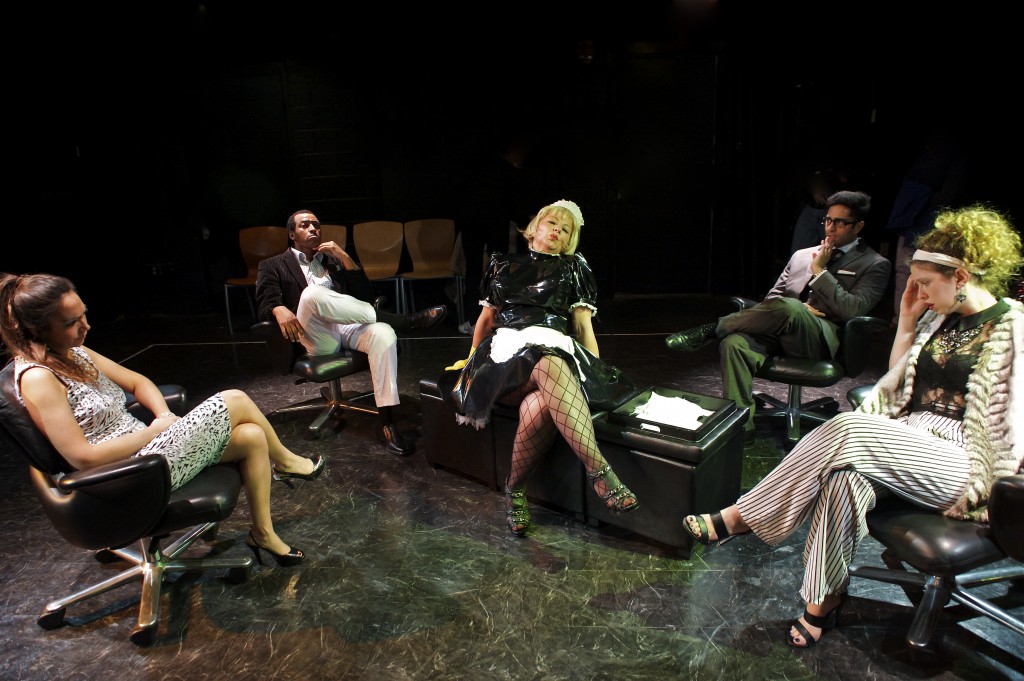




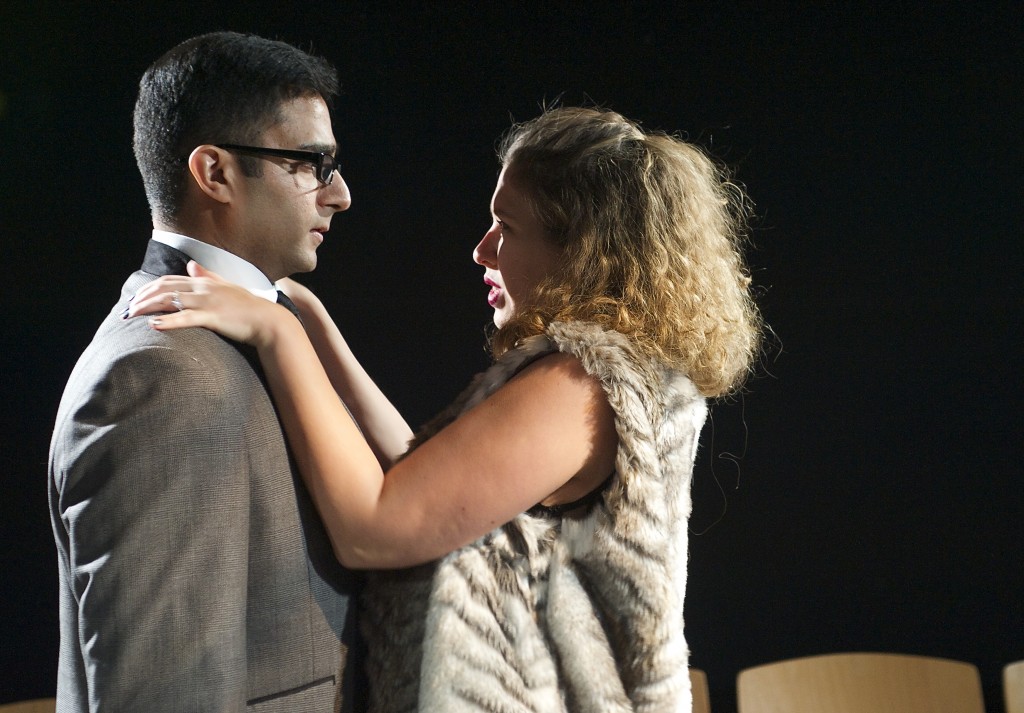

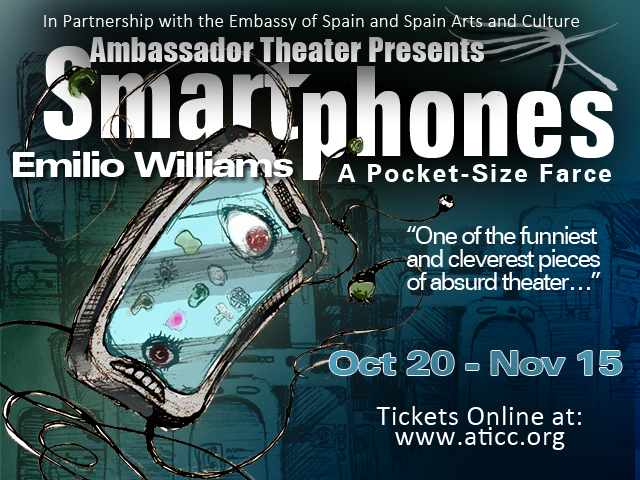


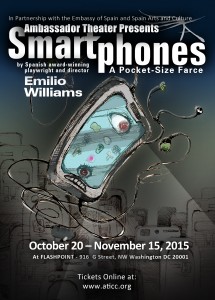




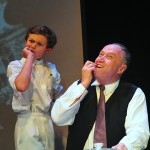

 It’s easy to misunderstand the avant-garde: we come to the theatre expecting a normal story told by actors who are easy to follow, with sets that are exactly what they appear to be. And when a production deviates from the norm we tend to squirm, flip through the program and hope the intermission comes soon so we can split for the bar down the block.
It’s easy to misunderstand the avant-garde: we come to the theatre expecting a normal story told by actors who are easy to follow, with sets that are exactly what they appear to be. And when a production deviates from the norm we tend to squirm, flip through the program and hope the intermission comes soon so we can split for the bar down the block.


